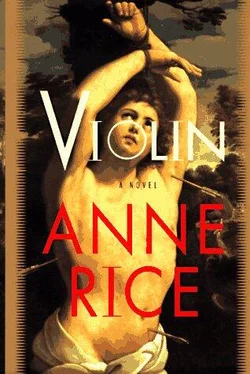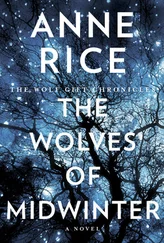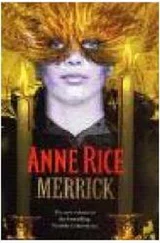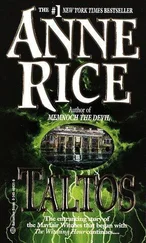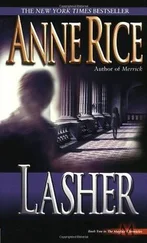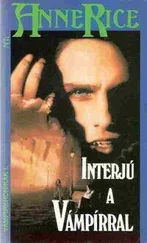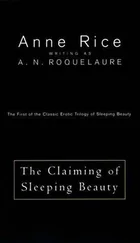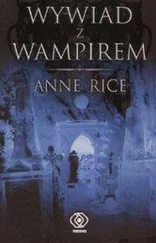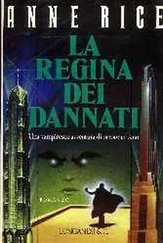Let it go.
It was music!
Something brushed my cheek. It was his lips. My elbow rose and I threw him over, past the bed. He was awkward, hopeless, grabbing for the bedpost and glowering at me as he struggled to stand.
I stopped, the last notes shimmering. Good God, we had spent the long night in our wanderings, or was it just the moon, yes, the moon in the cherry laurels and the big obliterating darkness of that building next door, a wall of the modern world that could shadow tut never destroy this paradise.
The sorrow I felt for her, the grief, the grief for her in that moment when she had kicked me, the eight-year-old girl here in this room, the grief I felt was flowing with the resonance of the notes in the air. I had only to lift the bow. It was natural.
He stood in fear of me against the far wall.
"You either give it back, or I warn you, I'll make you pay for this!"
"Did you cry for me? Or for her?"
"Give it back!"
"Or was it the sheer ugliness? What was it?"
Was it a little girl unable to breathe, in panic, clutching at her belly, her arm brushing the hot iron of the open heater, oh, this is such small sorrow in a world of horrors, and yet of all memories there had been nothing more secret, more awful, more untold.
I hummed. "I want to play." I began softly now, realizing how simple it was to glide the bow gently on the A string and the G, and to make a song all on that one lower string if I wanted, and let the soft grinding sound come up and into it; oh, weep, weep for the wasted life, I heard the notes, I let them surprise and express my soul in stroke after stroke, yes, come to me, let me know, let my mind reach out through this to find my mind; she did not live another year after she cried in the park, not even another year, her hair was long and brown, and on that last day no one went with her to the gate.
I think I sang as I played. Whom did you cry for, Stefan, I sang. Was it for her, was it for me, was it for shabbiness and ugliness? How good this felt to my arm, my fingers so flexible and exact, as if my fingers were tiny hooves stomping on the strings, and the music building upon my ear without a bass or treble cle{ such poor script for sound, such ancient inadequate code for this, I could command this tone, yet be astonished and swept up by it as I'd always been swept up in the song of the violin, only it was in my hands!
I saw her body in the coffin. Rouged like a whore. The undertaker said, "This woman has swallowed her tongue!" My father said to us, "She was so malnourished that her face turned black and collapsed, he's had to put on too much makeup. Oh, no, look, Triana, this isn't right, look, Faye won't recognize her."
And whose dress was that? That was a dark red dress, a ma genta dress. She never had such a dress. Aunt Elvia's dress, and she did not like Aunt Elvia. "Elvia said she couldn't find anything in her closet. Your Mother had clothes. She must have had clothes. Didn't she have clothes?"
It was so light, the instrument itsel£ so easy to keep in place, to tap, tap, tap for the flood of sound, familiar, embraced, easy as it was to the men and women of the hills who pick it up and dance with it in childhood before they can read or write, or even speak perhaps, I had yielded to it, and it to me.
Aunt Elvia's dress, but that seemed an abomination, not so very great, only unforgettable, a final disgusting irony, a bitter, bitter figure of neglect.
Why didn't I buy her dresses, wash her, help her, get her on her feet? What was so wrong with me? The music carried the accusation, and the punishment, in one unbroken and coherent current.
"Did she have clothes?" I'd said coldly to my Father. A black silk slip I remember, yes, when she sat under the lamp with her cigarette in her hand, a black silk slip on summer nights. Clothes? A coat, an old coat.
Oh, God, to let her die like that. I was fourteen. I was old enough to have helped her, loved her, restored her.
Let the words melt. That's the genius of it, let the words go; let the great rounded sound tell the tale.
"Give it back to me!" Stefan cried. "Or, I warn you, I'll take you with me."
Dazed, I stopped.
"What did you say?"
He didn't speak.
I began humming, holding the violin still so easily between shoulder and chin.
"Where?" I asked, dreamily, "where will you take me?"
I didn't wait for his answer.
I played the soft song that needed no conscious goad at all, just sweet and tumbling notes following as easy as kisses to a baby's hands and throat and cheeks, as if I held little Faye in my hands and kissed her and kissed her, so tiny, good God, Mother, Faye's slipped through the slats of the baby bed, look! I have her. But this was Lily, wasn't it?
Or Katrinka alone in the dark house with tiny Faye when I came home.
Vomit on the floor.
And what has become of us?
Where had Faye gone?
"I think. . .1 think perhaps you should start calling," Karl had said. "Two years your sister Faye has been gone. I don't think... I don't think she's coming back."
"Coming back." Coming back, coming back, coming back.
That's what the doctor had said when Lily lay still beneath the oxygen mask.
"She's not coming back."
Let the music cry this, and boil, and ease the fit of all this grief by giving it a new form.
I opened my eyes, playing on, seeing things, the world shining, strange and wondrous, but not naming the things as I saw them, merely seeing their shapes as inevitable and brilliant in the glow from the windows, the skirted dressing table of my life with Karl, and the picture there of Lev, and his beautiful son, the tall oldest boy with the light hair like Lev's and Chelsea's, the one named Christopher.
Stefan rushed at me.
He grabbed on to the violin, and I held it firm. "It's going to break!" I said, and then I whipped it free. Solid, light, a shell of a thing, as full of vibrant life as a cricket's shell before it was detached, was left behind, and could be crushed quicker than glass.
I backed up to the windowpanes. "I'll smash it, and who will be the worse off when I do!"
He was frantic.
"You don't know what a ghost is," he said. "You don't know what death is. You mutter about death as though it were a rocking cradle. It's stench and it's hate and it's rot. Your husband is ashes now, Karl. Ashes! And your daughter, her body bloated by gases and..."
"No," I said. "I have it, this violin, and I can play it."
He came towards me. He drew himself up, face soft with wondering but only for a moment. His dark smooth eyebrows were clear of any frown, and his long, darkly lashed eyes peered at me.
"I warn you," he said, voice deepening, hardening, though his eyes had never been so open and full of pain. "You have a thing that comes from the dead," he said to me.
"You have a thing that comes from my realm which is not yours. And if you don't give it back, I'll take you with me. I'll take you into my world and my memories and my pain, and you'll know what pain is, you wretched fool, you worthless bitch, you thief, you greedy, brooding, desperate human; you hurt all those who loved you, you let her die, and Lily, you hurt her, remember that, her hip, the bone, you remember that, her face as she looked up, you were drunk and you laid her down on the bed and she was...!"
"Take me into the realm of the dead? And that's not Hell?"
Lily's face. I'd thrown her too roughly on the bed; the drugs had eaten up all her bones. I'd hurt her in haste, she had looked up, did look up, saw me, bald, hurt, afraid, candle flame of a child, beautiful in sickness and in health; I had been drunk, dear God, for this I will burn in Hell, forever and ever because I myself will fan the flames of my own perdition. I sucked in my breath. I didn't do that, I didn't.
Читать дальше
